Elliott Footwear achieves more with less, using Zedosh

The world is experiencing a crisis of consumption. What we consume online is at an all time high.
We are bombarded with digital noise whether we like it or not – and when it comes to online ads, most often, we don’t. Between 20% – 25% of social posts are adverts and yet we spend hours a day glued to our social feeds. Long before Frances Haugen exposed how Facebook’s platforms are designed to hook our attention by rewarding our brain’s reward networks, many of us had already realised that our constant scrolling was time consuming and increasingly addictive. But more recently, we’ve come to realise why those platforms are so sticky – because the longer we spend on them, the more of our data and attention is being sold to advertisers, at any cost. Social media and Big Tech make money by exploiting our vulnerabilities and selling access to our eyeballs on a huge scale. This leads us to block, skip or tune out of ads that constantly interrupt and distract our content browsing, however, it doesn’t stop the fundamental problem of the ad being created and sent to our screen in the first place.
This is the inefficiency of advertising. And while to many, it is a nuisance – to some, it is funding life-altering, critical implications. We are talking about financial loss, scams, an increased risk of depression, anxiety, loneliness, self-harm, and in some cases, suicidal thoughts and actions – not to mention the additional impact it is having on the planet.
Zedosh was formed as a solution to the inefficiency of advertising. With all these distractions online, our goal is to build a safe space where verified brands can share their purpose with undistracted customers who want to hear and engage with their message. We do this by obtaining our users’ consent to analyse their shopping transactions in order to truly understand their interests and where they spend their money. In return for their undivided attention to video content, they get paid directly into their bank account.
We call it purpose-driven advertising: Advertising that cares about the impact it is having on the audience and the planet. Advertising that uses intent data instead of cookie-based browsing data. Advertising that produces far less waste. Our goal is to challenge the status quo that to advertise efficiently, you need enormous scale to achieve circa 1% engagement rates. We believe this is the future and it’s why we built our Attention Exchange® engine that makes this all possible.
Where it all began

Back in June, Zedosh was approached by Elliott Footwear – the world’s first Climate Positive vegan footwear brand. They remove 5x the carbon it takes to produce their shoes from the atmosphere with every pair sold.
Sam Carew, the founder, was looking for a new advertising channel through which they could share their story whilst staying true to their values. As a carbon-negative brand, the need to validate the carbon cost of their campaign was critical. This is when we came across Norris Media – the world’s first media agency to measure and reduce the carbon impact of online advertising. Thanks to their LinkedIn post that went viral, they weren’t hard to find!
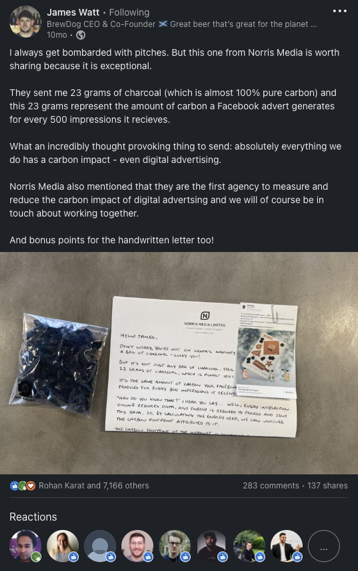
Our social carbon footprint
According to Norris Media, if the internet were a country, it would be the 6th largest polluter in the world.
Let that sink in a moment.
A report by the Advertising Association in the UK, claims that an average of 3.4 tonnes CO2e (carbon dioxide equivalents) is emitted each year per person working in an IPA (Institute of Practitioners in Advertising) agency, from operational emissions alone. Annually, they found the total average of operational CO2e emissions to be over 84,000 tonnes.
When it comes to social media, a recent study done by Greenspector revealed that the mere action of scrolling on your favourite channels has an environmental footprint, which is a lot higher than people think. Using any of the platforms below for five minutes a day would result in 20kg of carbon a year, which is the same as driving in a car for 52.5 miles. Remember, 20% of content is advertising!
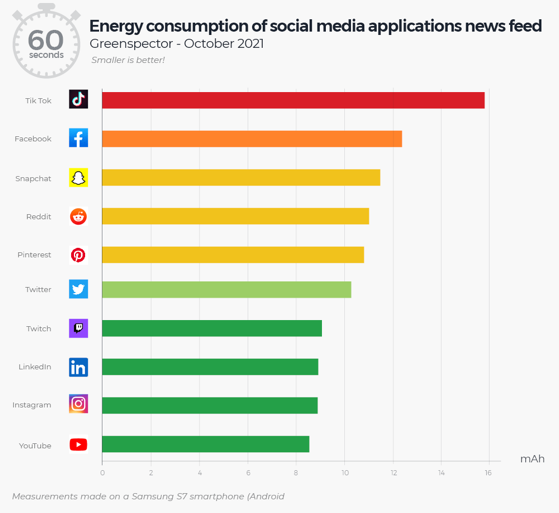
Image by Greenspector Now let's go back to our campaign with Elliott Footwear.
The Zedosh Method
By verifying our audience using Elliott Footwear’s bank account, not only do we receive clear consent to use their data to advertise to them efficiently, but it also means we are both bot-free and brand safe (we are looking at you, Twitter). Our audience is notified when a brand wants their specific attention and are invited to come engage with that content directly. This means we do not rely on any of the exploitation tactics mentioned in the opening section of this white paper, in order to attract and retain our audience. This audience *wants* to be advertised to and benefit from the fair value exchange that we enable. The result is that we are able to reduce the carbon footprint of campaigns by hyper-targeting consumers who we know earn and spend money in a certain way. Lastly, but perhaps most importantly, we do not need to track users using cookies or pixels to attribute the ad spend as we’re connected live to their bank account.. This entire process is managed by our Attention Exchange® engine.
To prove all this, Norris Media set out to test this theory by running Elliott’s 27 second video campaign on Zedosh and Facebook, simultaneously.

Zedosh App Interface
Our primary goal was to determine how many people we could attract to Elliott’s website by spending £500 on each platform. We used the carbon cost per click as the benchmark. Zedosh was able to generate 2,822 clicks with the £500 spent on consumers who have made a sustainable shoe transaction in the last 12 months. To determine the equivalent carbon cost per click on Facebook, we extrapolated the results on Facebook to match 2,822 clicks.
The extrapolated results are shown below:
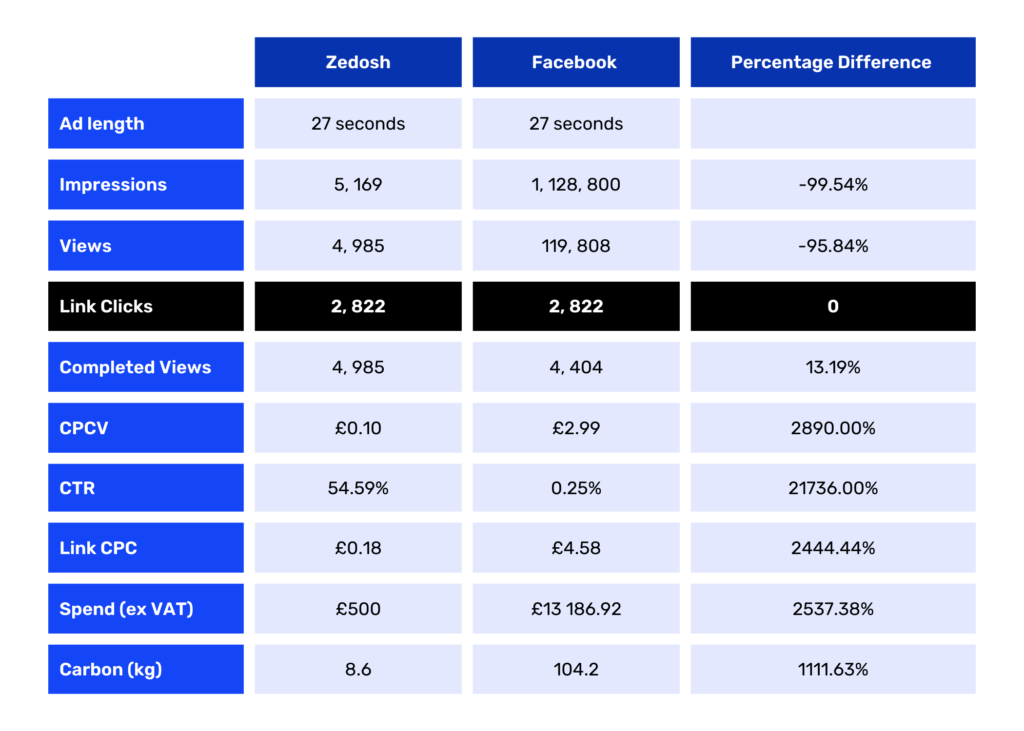
At a glance, the table shows that with 5,000 impressions, Zedosh was able to achieve as many link click-throughs that Facebook would have got from 1,128M impressions! That’s 99.54% fewer impressions, for the same result.
Our unique value exchange between brand and consumer means that our audience are hyper-engaged, opting in to watch the video without us needing to interrupt users who don’t care.
The above not only reveals the possibilities offered by this hyper-personalised model, but the amount of waste campaigns on current platforms produce as a result.
To calculate how much carbon (energy) those impressions required, we needed to know how much video data was transferred to the audiences’ phone and how much energy was required to transfer that data. To get accurate results, we turned to the experts at Norris Media.
You can see the results below.
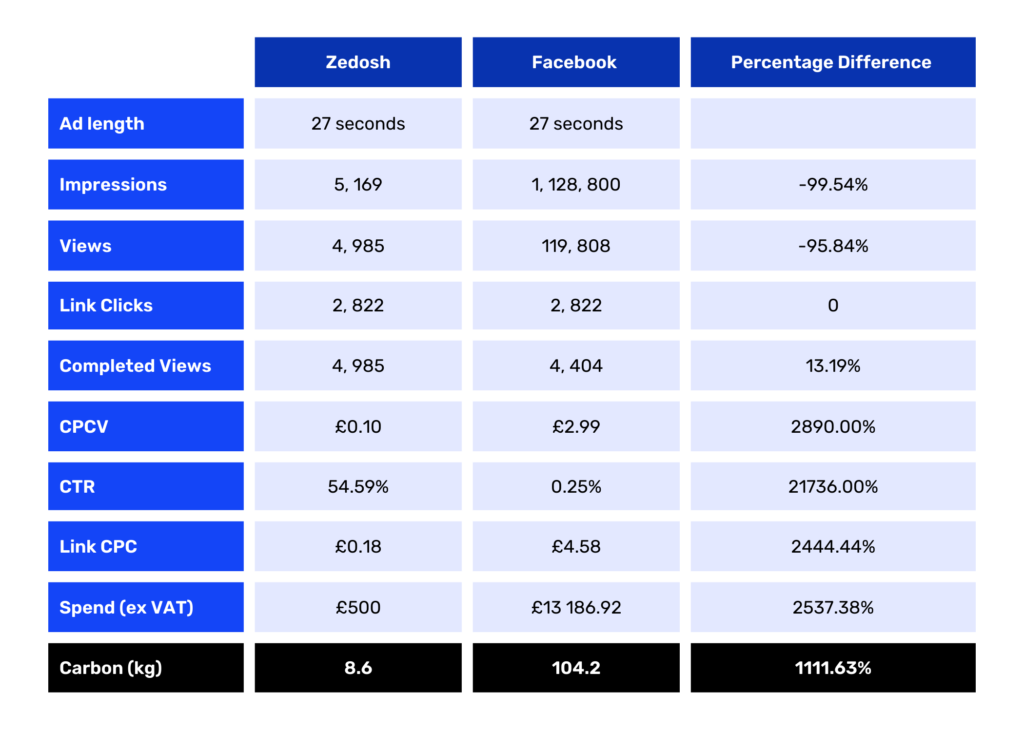
This table shows Facebooks’ carbon output was over 1000% greater than Zedosh’s, to achieve the same clicks to site whilst also costing 2,537% more.
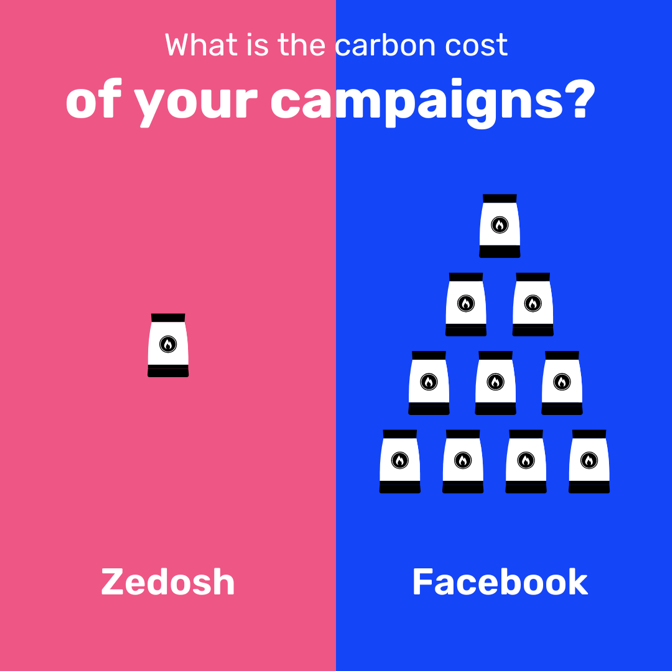
Part of this discrepancy has to do with the way Zedosh has been designed. Our ad server streams rather than downloads videos to the device of human consumers who have a propensity to spend on certain products (in Elliot’s case, trainers and sustainable products) and who then have to press ‘play’ before streaming begins. Facebook on the other hand transfers 75% of the video as it appears ‘in feed’, even if you do not play it. The final 25% is downloaded after the first 3 seconds are played. According to Facebook, 3 seconds is a ‘view through’ whereas on Zedosh, only 100% of the video, on 100% of the screen for 100% of the duration is considered a view and therefore, billed.
Our Conclusion
The above not only reflects the wastage that occurs when advertising on social media, but the far-reaching consequences this has on people and our planet.
Thanks to Norris Media and Elliott Footwear, we could prove that not only is it possible to use advertising for good, but we can achieve this without compromising a campaign’s performance metrics.
The above is a call to action for more brands to reflect on their unsustainable and potentially unethical methods for hooking our attention. Why interrupt us at scale with your ads when you could be developing meaningful relationships with real consumers whilst lowering the impact on the planet?
For more information about the Zedosh App and how it can support your marketing and sustainability goals, get in touch [email protected].
If you’re a publisher looking to deliver advertising in this new model to your audience, please get in touch [email protected]
Zedosh is a member of the Conscious Advertising Network and checks every piece of content to ensure it complies with the company’s content policy before it is published.
Attention Exchange® is a registered trademark of Zedosh Limited. Zedosh is a limited company registered in England and Wales No. 12339592. Registered with the Financial Conduct Authority (“FCA”) as PSD Agent of Moneyhub Financial Technology (FRN 942396). The registered address is Third Floor, 20 Old Bailey, London, EC4M 7AN, United Kingdom.
